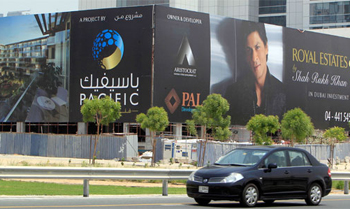 Abu Dhabi, Aug 6: As the UAE’s real estate stages a strong rebound from historic lows after the global financial crisis, Bollywood superstar Shah Rukh Khan is seen to be an active player in the emirate’s fast-growing industry.
Abu Dhabi, Aug 6: As the UAE’s real estate stages a strong rebound from historic lows after the global financial crisis, Bollywood superstar Shah Rukh Khan is seen to be an active player in the emirate’s fast-growing industry.
The legendary film star, entertainment mogul, sports magnate and the business-savvy actor is going to be back in the emirate’s property business with a bang by launching a Dh2.4 billion The Royal Estates by SRK project in Dubai today.
The superstar, also known as “King Khan” and owns Red Chillies Entertainment and the Kolkata Knight Riders, is also expected to be part of another landmark development in coming days by announcing a revival of seven-year old mega project in Ras Al Khaimah.
In an exclusive interview with Khaleej Times, Khan expressed his desire to revive Dh8 billion SRK Boulevard project “very soon”. The mega development was launched in 2007 but put on hold later in the wake of the global financial crisis. It was not the only development that was halted as several other projects across the UAE were also put on hold because of the financial crisis that badly hit the property business in Dubai.
“I’m not well versed with the real estate business. I did participate in a wonderful venture called SRK Boulevard and I hope I can restart the project soon,” Khan said.
Khan, who also owns a villa on Palm Jumeirah, didn’t rule out a property business venture in the future and said if there is an “exciting proposal” like SRK Boulevard, he might consider it positively.
“SRK Boulevard was really very exciting because I was designing the project and hopefully, maybe, we will be able to revive it again very soon,” Khan said. SRK Boulevard, comprising multiple residential towers on Dana Island off Ras Al Khaimah, was to house several hotels, a shopping centre and commercial complexes spread across 6.3 million sqm. King Khan, who was actively involved in from start to finish of SRK Boulevard, contributes extensively to the conceptualisation and design of the residential complex that bears his name and is expected to have a home in it.
According to industry sources, the project is likely to be re-launched under a new developer and its design concept is being currently reworked to add or remove certain components from the original plan.
Los Angeles-based architect Tony Ashai of Ashai Design Corporation, who was previously engaged to design SRK Boulevard, is now involved in The Real Estate by SRK to execute the Bollywood star’s dreams features in affordable housing project in Dubai’s booming market.





Comments
Add new comment